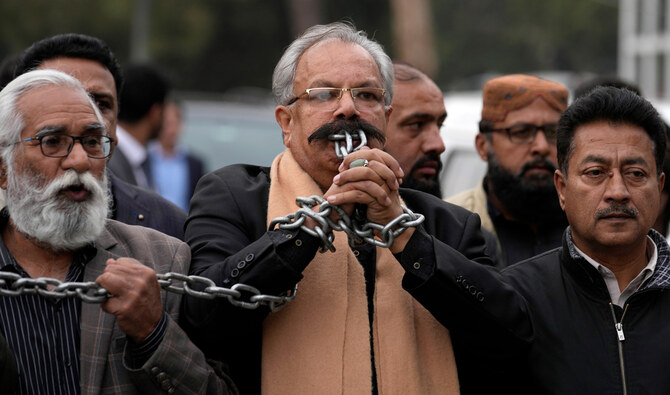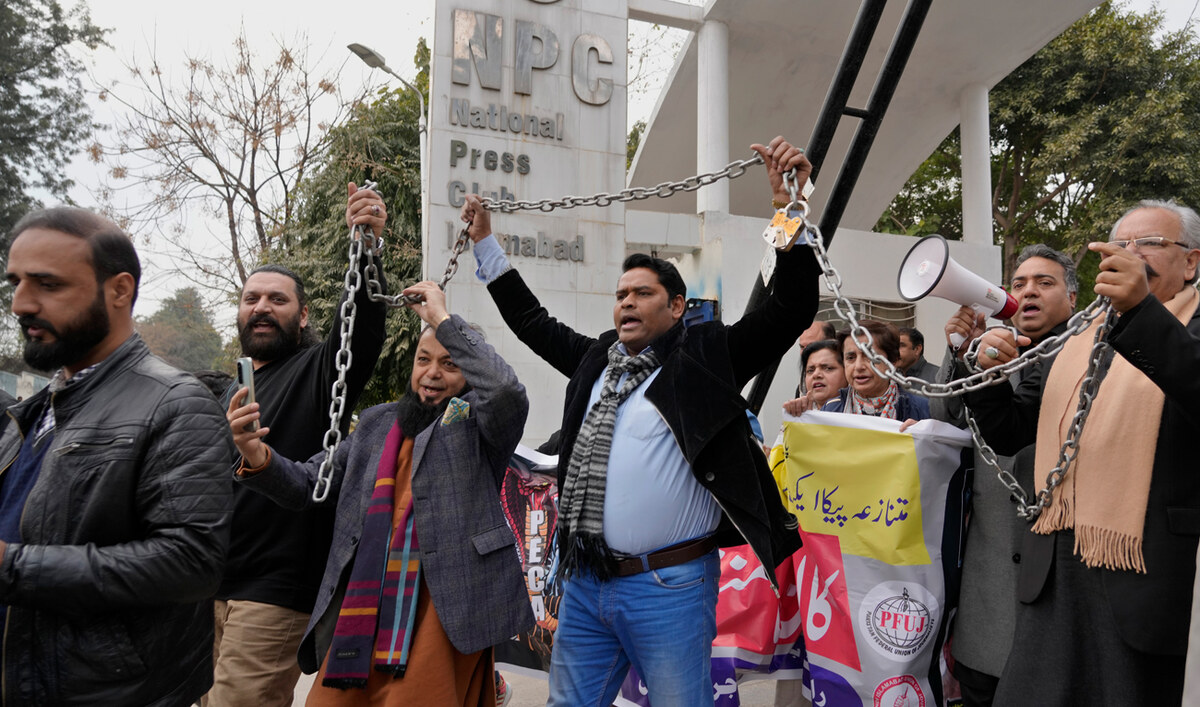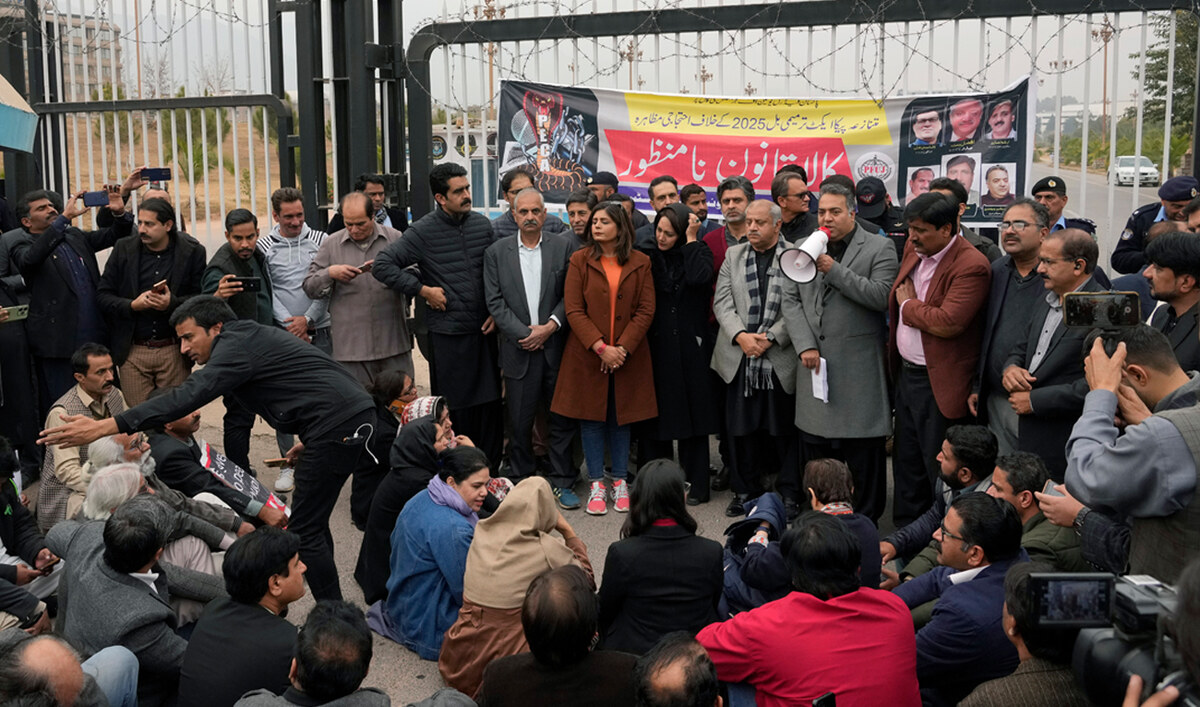ISLAMABAD: As part of the an intitiative to ensure justice and accountability, the federal cabinet on Thursday approved plans to renew a prisoner exchange program with the United Kingdom and Northern Ireland.
The Prisoner Exchange Treaty (PET) was part of an understanding reached between the two parties in September this year.
"The UK-Pakistan prisoner transfer agreement will be important for both countries," Thomas Drew, British High Commissioner to Pakistan said on Friday, adding that the move would "allow prisoners of each country to serve their sentences in their home country”.
However, before the PET is implemented, it needs to be ratified by the British parliament first. The deal is a vital component of a greater initiative formulated to tackle issues pertaining to money laundering, theft of assets, and most-wanted criminals, through an adhoc extradition process agreed upon by the two main countries.
Eradication of corruption and ensuring accountability featured heavily on Prime Minister Imran Khan's post-election agenda and continues to be an integral part of his Pakistan Tehreek-e-Insaaf party's manifesto.
Clarifying what the treaty entails, former Pakistan High Commissioner to the UK, Ambassador Wajid Shamsul Hassan, told Arab News: “This prisoner exchange agreement does not mean (full) extradition treaty. Even during my time as HC, there was an understanding over exchange of prisoners."
A formal extradition treaty between Pakistan and UK does not exist despite Islamabad's tireless efforts in trying to persuade the British government -- which has signed treaties with more than a 100 countries, including India -- to ink a deal.
"Pakistan until now has not succeeded in signing that treaty. PM Khan’s government made fresh efforts to arrive at an understanding on the extradition treaty. And there was a sort of breakthrough when British Home Secretary Sajid Javed visited Pakistan and held talks with government officials. While extradition treaty remains an elusive dream, the two governments did reach an understanding over the transfer and exchange of prisoners," Hassan, Pakistan’s longest serving High Commissioner to London, said.
Terms and conditions for ratification of the previous treaty were exchanged on August 19, 2008, but the treaty was suspended by Pakistan in 2015 under the directives of former Prime Minister Nawaz Sharif.
This was after Britain lodged a complaint citing a violation of the treaty, whereby it stated that criminals repatriated from the UK had been released by Pakistan without completing their sentences. This forced Islamabad to suspend all similar treaties until the "formulation of a transparent policy”.
On it's own, the general principal of the treaty states that: “A person sentenced in the territory of the state of one party may be transferred to the territory of the state of the other party, in accordance with the provisions of this agreement, in order to serve the sentence imposed on him."
Despite the lack of an official policy, Pakistan last month extradited a fugitive from Rawalpindi to UK. Arrested in 2015, he was wanted for killing eight members of a family in 2002 and was the second person to be extradited to Britain.
According to the British Home Office, the UK is open to lodge an extradition request to Pakistan, or to any other territory with which it does not have an extradition treaty. It is for the territory concerned to decide whether or not it should act on such a request, according to its own domestic law, renowned British journalist Owen Bennet Jones said in his article on a Pakistani man charged with double murder and extradited to UK in 2016.
This arrangement, however, does not fulfill the federation or its corruption watchdog’s (National Accountability Bureau) exhaustive pursuit to bring back individuals residing in England in the absence of an extradition treaty.
Eradication of corruption and ensuring accountability featured heavily on Prime Minister Imran Khan's post-election agenda and continues to be an integral part of his Pakistan Tehreek-e-Insaaf party's manifesto.
Two of Sharif's sons and his loyalist Ishaq Dar, the former finance minister, have been declared absconders by Pakistan's court but are safely residing in England, as Pakistan has not been able to secure their apprehension or extradition from London.
Hassan reasons that the likelihood of UK agreeing to sign the treaty -- based on a commitment which PM Khan made to the nation to bring back absconders, former state officials and individuals charged or suspected of embezzlement, corruption, and crime -- remains in limbo -- even as the former envoy highlighted the country’s checkered history and human rights track record.
"Public opinion in Britain and the members of parliament are wary of Pakistan’s human rights record. It is generally feared that the treaty would be abused to seek extradition of Pakistan’s political dissenters who often find safe refuge here from a revengeful government," Hassan said, citing the examples of former political leaders who took refuge in the UK and "carried on their political struggle".
"Former Prime Minister Benazir Bhutto, former Prime Minister Nawaz Sharif and currently Altaf Hussain, besides hundreds of others, including members of minority communities accused of blasphemy have taken refuge here," he said.
Pakistan to revive prisoner exchange program with UK
Pakistan to revive prisoner exchange program with UK

- Formulated in 2007, the treaty was suspended by Islamabad eight years later
- Move to ensure prisoners serve sentences in their respective home countries
Texas hedge fund manager close to Trump leads investment delegation to Pakistan— state media

- Gentry Beach is leading “high-level” investment delegation on two-day visit to Pakistan, says state media
- State broadcaster says several agreements between Pakistan and US were signed during delegation’s visit
Islamabad: A high-level delegation of American investors featuring a business partner of US President Donald Trump has arrived in Pakistan, state broadcaster Radio Pakistan reported on Tuesday, adding that several agreements between the two countries were signed.
The delegation, led by Texas hedge fund manager Gentry Beach, has arrived in Pakistan for a two-day visit to the country. Pakistani state media said that the delegation’s arrival days after the new American administration taking office is of “great importance.”
“The visit of the US delegation to Pakistan will open new avenues for investment, economic and bilateral relations between the two countries,” Radio Pakistan said.
The development takes place as cash-strapped Pakistan engages with countries to secure foreign investment in its key economic sectors such as energy, agriculture, mining and minerals, livestock and others.
Prime Minister Shehbaz Sharif’s government has sought increased foreign trade and investment as a remedy to Pakistan’s economic woes. Pakistan, which came to the brink of a sovereign default in 2023, has suffered from a prolonged macroeconomic crisis that has drained its economic resources, weakened its currency and exacerbated its balance of payments crisis.
The South Asian country had a flurry of high-level exchanges with Saudi Arabia, Japan, Azerbaijan, Qatar and Central Asian countries last year in a bid to support its $350 billion fragile economy.
Islamabad formed a hybrid civil-military investment body in June 2023 to fast-track decisions related to investment in Pakistan’s key economic sectors. The government credits the Special Investment Facilitation Council (SIFC) for aiding its efforts to turn Pakistan’s economy around and increasing its exports over the past year-and-a-half.
However, ties between Pakistan and the US have always remained complicated. Both countries shared close defense and security cooperation in the past, particularly during the Cold War after the 1979 Soviet invasion of Afghanistan and post-September 11, 2001 attacks.
However, more recently, US officials criticized Pakistan for not sufficiently supporting their military efforts against the Taliban following the 9/11 attacks. Islamabad denies sheltering Taliban fighters and helping them regain control of Afghanistan in August 2021.
Pakistan Navy’s ‘Yamama’ holds bilateral exercise with Saudi ship in Jeddah

- Navy says exercise aimed to strengthen naval cooperation and enhance interoperability between the two allies
- Ship’s crew held table-top discussions on maritime issues with Saudi naval leadership, says Pakistan Navy
ISLAMABAD: Pakistan Navy said its newly commissioned Yamama ship visited Jeddah on Tuesday where it met the Royal Saudi Naval Forces (RSNF) leadership and held a passage exercise (PASSEX) with the Kingdom’s ‘Makkah’ ship, saying the activities were designed to strengthen cooperation and foster interoperability.
Yamama is Pakistan Navy’s fourth Offshore Patrol Vessel (OPV) that it says is equipped with advanced technologies and designed to operate in contested maritime environments. Upon its arrival at Jeddah port, the ship was received by senior RSNF officials and representatives from the Pakistan Embassy, the navy said.
During its stay, the ship’s crew engaged in professional activities, including cross-ship visits, table-top discussions on maritime issues and meetings with the RSNF leadership.
“Following the port visit, PNS YAMAMA conducted a PASSEX with HMS Makkah,” Pakistan Navy said. “The exercise was designed to strengthen naval cooperation and enhance interoperability between the two navies. Both forces reaffirmed their commitment to ensuring maritime security and promoting regional stability.”
The statement said Yamama’s visit to Saudi Arabia and the passage exercise further reinforced “strong brotherly relations” and defense collaboration between the two countries.
Pakistan and Saudi Arabia enjoy strong defense ties and bilateral security cooperation. The two nations regularly engage in joint air, ground and sea military exercises while several cadets from the Kingdom, along with counterparts from other Middle Eastern nations, annually visit Pakistan to undergo specialized military training.
Apart from defense and security ties, Pakistan enjoys strong economic and trade relations with Saudi Arabia. The Kingdom is home to over two million Pakistani expatriates, serving as the top source of remittances for the cash-strapped South Asian country.
Experts say Washington’s move to suspend foreign aid won’t impact Pakistan significantly

- US last week paused all foreign assistance to countries, saying will review if they are consistent with foreign policy
- Washington has invested in Pakistan’s critical energy, economic development and agriculture sectors over the years
KARACHI: Pakistani economists and former diplomats on Tuesday brushed aside the new American administration’s decision to suspend foreign assistance for countries around the world including Pakistan, saying it will not have a significant impact on the South Asian country and could even force Islamabad to undertake much-needed economic reforms.
US State Department confirmed on Sunday that Washington has paused all US foreign assistance funded by or through the State Department and US Agency for International Development (USAID), adding that America would review all foreign assistance programs to ensure if they are efficient and consistent with US foreign policy.
The program affects all recipient countries, including Pakistan, where numerous US-funded programs are currently in progress. For over 70 years, the US-Pakistan development partnership has been instrumental in supporting sectors such as energy, economy, agriculture, education and health. The South Asian country has been grappling with an economic crisis that in 2023 almost pushed it toward a sovereign default.
Washington has invested over $205 million in Pakistan’s energy sector, as per USAID’s website and has also provided assistance to economic development programs such as the Investment Promotion Activity ($16.8 million) and the Pakistan Private Investment Initiative ($43.5 million), aimed at enhancing Pakistan’s business climate and supporting small and medium enterprises (SMEs).
“I’m not sure if the suspension of aid will be very harmful because the real harm to the economy is coming from our own policy governance,” Kaiser Bengali, a leading Pakistani economist, told Arab News.
“On the whole at the macro level, we have seen that in the last 40 years, foreign assistance has not contributed to the economy.”
Bengali said Pakistan’s current economic issues were largely self-created.
“We have created this deficit, balance of trade, balance of payments [crisis],” he said. “We have created a huge debt burden, borrowing loan after loan for the past thirty years and not investing debt funds to increase the productivity of the economy.”
Pakistan’s Information Minister Ataullah Tarar and Khurram Schehzad, adviser to the government on finance, did not respond to Arab News’ request for comment. Pakistan’s foreign officer spokesperson Shafqat Ali Khan said he would address the queries during the foreign office’s weekly press briefing.
Zamir Akram, a former Pakistani ambassador, agreed with Bengali. He said Washington’s assistance to Pakistan is “limited” and its overall impact on the country’s economy is “negligible.”
“Since the US assistance for Pakistan is less and its funding is very low, it doesn’t have great impact,” Akram told Arab News. “We don’t know the amount of project-based assistance but its overall national assistance for Pakistan is negligent. So that’s why it won’t make any impact.”
However, Ahmed Bilal Mehboob, founder and president of Islamabad-based think tank Pakistan Institute of Legislative Development and Transparency (PILDAT), emphasized that the suspension could have significant consequences for Pakistan’s civil society and development sectors.
Mehboob said an estimated 10,000 to 15,000 people were working in organizations working to protect democracy and human rights in Pakistan.
“If funding is halted in the future, not only will thousands be left unemployed but governance and human rights work will also be severely affected,” Mehboob told Arab News.
However, he cited India’s example where civil rights groups grew indigenously, saying that they began receiving minimal foreign funding much later.
“Sincere people will continue their work using local resources,” he said.
Bengali said there might be a silver lining to the suspension of foreign assistance, adding that it may prompt Pakistan to seek local solutions and implement necessary reforms.
“If the entire world stopped funding Pakistan, that would actually be a big favor to the country,” Bengali said. “It would force us to make the necessary reforms and find our own solutions.”
Pakistan says ‘long’ Hajj package under government scheme to cost $3,805

- Long and short Hajj packages prices to cost $3,847 and $4,124, respectively, religion ministry says
- Pakistan introduced 20-25 day duration Hajj program for pilgrims’ convenience for first time this year
ISLAMABAD: Pakistan’s religion ministry announced the final cost of the government’s long and short duration Hajj packages, saying that the former will cost Rs1,075,000 ($3,805) per head while the cost for the shorter duration has been set at Rs1,150,000 ($4,120).
Saudi Arabia has allocated a quota of 179,210 Hajj pilgrims for Pakistan in 2025, with an equal split between the government and private schemes. Pakistan last year set the same cost for Hajj 2024 under the government scheme.
Pakistan’s Ministry of Religious Affairs (MoRA) this month said the government had introduced a “shortened” Hajj program of 20 to 25 days for the first time which would make the journey easier and more accessible for Pakistani pilgrims. Pakistan’s Hajj Policy 2025 also allows pilgrims to pay for the pilgrimage in installments for the first time ever.
“The Ministry of Religious Affairs has announced the final Hajj package prices,” the religion ministry said. “The final price of the long Hajj package has been set at Rs10,75,000 while the short Hajj package has been set at Rs11,50,000.”
The statement added that the third installment of Hajj dues will be collected from Feb. 1-10.
It said limited seats were left for the government’s Hajj scheme, adding that its applications would be accepted until Jan. 30. The statement also mentioned that bookings for the short Hajj scheme had now been filled.
“New applications will be accepted on a first-come first-serve basis until Jan. 30,” it added. “Private Hajj pilgrims can continue booking until Jan. 31.”
The ministry also advised Hajj organizing companies to immediately upload the data of private pilgrims to the government’s e-portal.
The ministry has also launched the Pak Hajj 2025 mobile application, available for both Android and iPhone users, to guide pilgrims. Additionally, the government announced a reduction in airfare, lowering ticket prices for federal program pilgrims to Rs 220,000, down from last year’s Rs 234,000.
Pakistan International Airlines, Saudi Airlines, and private carriers have agreed to transport pilgrims this year.
Pakistani journalists rally against law regulating social media

- Proposed law contains three-year prison sentence, $7,200 fine for sharing fake news
- Pakistan Federal Union of Journalists say law is a “direct attack” on freedom of the press
ISLAMABAD: Hundreds of Pakistani journalists rallied on Tuesday against a proposed law to regulate social media content that they say is aimed at curbing press freedom and controlling the digital landscape.
The law would establish a regulatory authority that would have its own investigation agency and tribunals. Those found to have disseminated false or fake information face prison sentences of up to three years and fines of 2 million rupees ($7,200).
The Pakistan Federal Union of Journalists led rallies in cities including Islamabad, Karachi and Lahore, to demand the government withdraws the bill, which has been passed by parliament but has yet to be signed into law by the president.
“It is a direct attack on press freedom,” PFUJ President Afzal Butt said at the rally in Islamabad, before police blocked him and other protesters from marching toward the Red Zone, which houses the prime minister’s secretariat, parliament and diplomatic offices.

“Our movement will continue until the law is revoked.”
Digital media in Pakistan has already been muffled with measures by telecom authorities to slow down Internet speeds, and social media platform X has been blocked for more than a year.
Reporters Without Borders, an organization that defends press freedom, ranked Pakistan at number 152 out of 180 on its 2024 world Press Freedom Index. The group also says Pakistan is one of the most dangerous places for journalists to work.

Parliament passed the amendments to the law known as Pakistan Electronic Crimes Act last week.
The government has defended the new regulations, saying the law is being introduced to block fake and false news.











